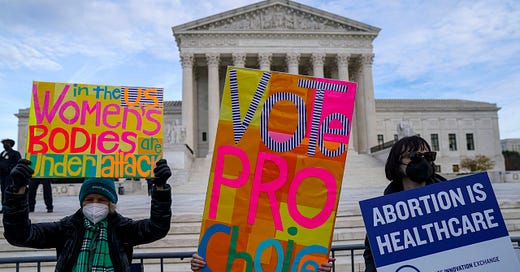
Swing Voters and the New Abortion Reality
They don’t like the Dobbs decision. And they care about it. The question is: How much?

An overwhelming majority of Americans oppose the Supreme Court’s decision in Dobbs, which overturned Roe v. Wade. Concurrently, an overwhelming majority of Americans think abortion should be legal in at least some cases. But how will these views translate to voting behavior among swing voters?
This month, as part of our Swing Voter Project, we asked focus groups of Trump-to-Biden voters across North Carolina what’s changed for them when it comes to their likely voting behavior in the wake of the Dobbs decision.
Among eleven North Carolinian swing voters, nine said that Dobbs would be a top-three issue for them in the midterms, which seems significant. Except that issue matrixes are often complicated: Earlier in the same focus groups, we asked which one issue in the news concerns them the most and only one said abortion. We have seen similar results in recent months, where abortion is a leading issue, but it competes with various others—such as inflation and gun violence—for the top concern.
Notably, nearly all the swing voters we interviewed in recent months—despite having voted for Trump in 2016—are pro-choice, rather than pro-life. This suggests that abortion was not a major concern to them when they cast their ballots for Trump six years ago.
So, what’s changed for North Carolina swing voters—eight independents, two Democrats, and one Republican—since the Dobbs ruling?
“I was registered as a Republican,” said Alana, 26, from Dover, North Carolina. “I still am right now, but I'll be switching completely to Democrat. As I say, most Republicans are the reason why this happened, and I just can't stand by and agree with something that has affected myself, my family, and friends so much. It's just something that has upset me greatly.”
Alana wasn’t alone. Kayla, 34, from Mocksville, North Carolina, said,
I was registered unaffiliated. I didn't see myself as a Republican or a Democrat, but I would vote for a Republican if I thought that candidate had my views for the economy. But nah, I'm leaning left completely. And this is personal for me. So I'm probably going to end up registering as a Democrat from here on out.
Kayla added that people she is related to are thinking similarly: “[A] lot of my family members have switched to Democrat because of this, because a woman [should] be able to choose, especially if they're carrying a child that isn't gonna make it.”
Marie, 59, from Holly Springs, North Carolina, said,
I don't really pay attention to what the party is. It's about, “What do they stand for? What are they saying they're going to do?” I [didn’t] really look at the party [before Dobbs]. I'm paying more attention to what party you [are] aligned with now.
She added that she has a daughter who has never focused on politics. “I think it angered her enough that she's beginning to pay attention, and wants to be more involved and probably will begin to vote.”
Speaking of voting propensity, eight of the respondents—including those cited above—said they are very likely to vote in the midterms. Two others said they were a maybe on voting, despite being unhappy with the Dobbs decision. The abortion ruling matters to them, they said, but it’s clear from their comments they require a stronger prod.
Theo, 43, from Cary, North Carolina, explained: “What's changed for me is looking at the senators or the congressmen [and] women who are supporting this [overturning Roe]. And what's changed for me is that I may not support them for one more term.” Note his use of the word “may,” rather than “will.”
Laura, 43, from Raleigh, said that she is “hit or miss” when it comes to voting in midterms. Her husband is a politically-engaged truck driver who’s frequently on the road. If he’s home on Election Day, she said she is likelier to vote than if he’s out driving. Laura indicated that “the candidate who supports taking away that right from women would be less appealing to me than they would've been before.” Again: Note the use of the words “would be,” rather than “is definitely.”
Then there was Jen. Prior to hearing the focus group discussion about abortion, Jen, 47, from Waxhaw, North Carolina, admitted she was not likely to vote in November—she is busy with four kids and avoids midterms. After listening to the other respondents, however, she said, “You have all got me thinking that I need to do some research on this midterm and maybe get out there and vote.”
In the closely-contested Senate race between Cheri Beasley and Ted Bud, how is abortion affecting North Carolina swing voters’ thinking?
Nearly all respondents who said they were likely to vote said abortion will figure into their voting decision. That would benefit the Democrat, Beasley.
Shanequa, 44, from Wilson, North Carolina, said, “I feel like [Beasley will] be for the women with the abortion rights. And that it was overturned, I feel like she disagreed with that, that it shouldn't have been [decided that way].”
“If one of [the midterm candidates] does not want to allow abortion, that's going to affect my decision,” added Russell, 47, from Kernersville, North Carolina.
Rachid, 43, from Raleigh, agreed, and inserted one more consideration: “More Democrats in the Senate will help if there is an idea to pack the Supreme Court. So we need more people that support that idea.”
We won’t know the electoral impact of Dobbs until the votes are counted. But this month’s focus group suggests that with swing voters, the issue salience is high and helpful to Democrats.









